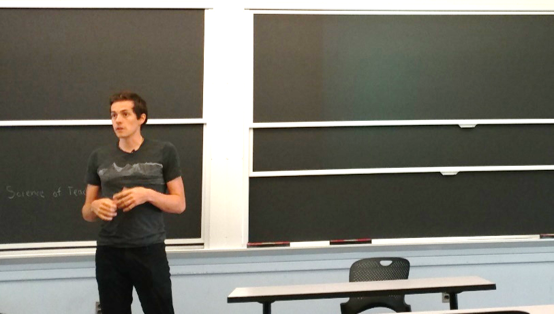
Pierre Dubuc, founder and CEO of OpenClassrooms, spoke at MIT’s xTalk “Building Education-to-Employment Programs That Actually Work.” OpenClassrooms started as a Massive Online Open Course (MOOC) platform in France but has since grown to three million monthly users from nearly 130 countries, many in search of professional development or a certification, but increasingly non-traditional students seeking a bachelor’s or master’s degree online.
“We started with the idea of finding what makes students employable,” Dubuc said. From there, he and co-founder Mathieu Nebra constructed a curriculum that let students learn at their own pace online while supplementing that learning with mentors that video-chat with students on a weekly basis. Mentors are chosen as experts in their field and help students prepare for what the future job will entail.
Dubuc says “for example, if someone is studying data-science, you’ll chat with a mentor working in data-science who becomes your personal coach.” Mentors are trained and compensated for their time, and only coach a handful of students to ensure they maintain their full-time jobs and remain experts in their field.
OpenClassrooms has become so popular that industry partners have joined on to provide apprenticeships. Through the program, companies like Capgemini, one of the world’s top IT service firms, will hire students directly, sign them to an employment contract and salary, and pay for their tuition. Students then split their time learning on the job and studying online to complete their degree program. “This is a cost-effective solution for finding an unlimited talent source for employers,” Dubuc says.
Every program at OpenClassrooms starts with the “Learn how to learn” course, a treatment to help students develop the skill of learning which includes: developing your skills, your attitudes, values, and your way of being in the world; as well as managing learning objectives and creating a personalized learning plan.
Dubuc is realistic in his assessment of the current state of higher education. “There’s more to college than a degree. OpenClassrooms isn’t for everyone because there are things you can’t replicate online such as face to face discussions with peers and professors, living on your own, learning how to be independent, and shaping yourself with friends.”
However, unlike most higher education institutions, OpenClassrooms offers a job guarantee for their graduates. “We have a commitment to finding work for our graduates, we guarantee that you’ll find work within six months or we refund our students in full.” Perhaps more universities and colleges need to make that a priority as well.